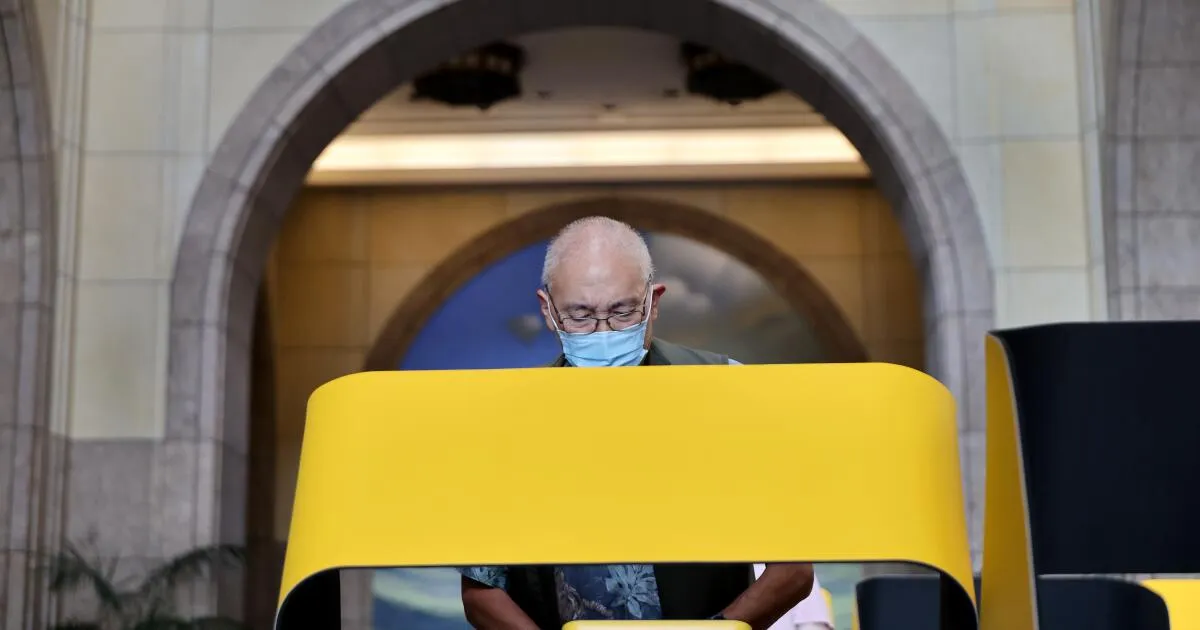
A significant development is unfolding in California as the statewide ballot measure, Proposition 50, backed by the state's Democrats, appears to be gaining momentum ahead of the November 4 election. The measure aims to assist the Democratic Party in gaining control of the U.S. House of Representatives while countering President Trump's agenda. A recent poll conducted by UC Berkeley's Institute of Governmental Studies, co-sponsored by The Times, indicates that approximately six out of ten likely voters are in favor of Proposition 50. In contrast, around 38% of likely voters oppose the proposal.
Interestingly, this off-year special election has garnered significant attention, with 71% of likely voters reporting that they have heard considerable information about the ballot measure. Mark DiCamillo, the director of the IGS poll, expressed his surprise at the high level of awareness surrounding such a complex issue. “That’s extraordinary,” he remarked, noting that even though redistricting may not impact voters' daily lives directly, it remains a topic of interest.
One reason for this heightened awareness could be the immense financial resources dedicated to the campaign for and against Proposition 50. In less than three months, nearly $158 million has been raised by the main campaign committees, as reported in recent fundraising disclosures. Californians have been inundated with political advertisements, particularly during major events like the World Series. Viewers witnessed a prominent advertisement featuring former President Obama, Governor Gavin Newsom, Massachusetts Senator Elizabeth Warren, and other influential Democrats advocating for Proposition 50, which likely cost around $250,000 to air.
The poll results reveal a stark partisan divide regarding Proposition 50. Over 90% of Democrats support the measure, while a similar proportion of Republicans oppose it. Among voters who identify with other political parties or have no party preference, 57% favor the ballot measure, with only 39% opposed. Remarkably, only 2% of likely voters surveyed were undecided, a statistic DiCamillo described as unusual. Historically, undecided voters tend to lean towards maintaining the status quo, often opposing ballot measures.
Support for Proposition 50 is notably strong in urban areas such as Los Angeles County and the San Francisco Bay Area, where the measure leads by substantial margins. In contrast, voters in Orange County, the Inland Empire, and the Central Valley appear to be more divided on the issue. This reflects the ongoing redistricting battles occurring in various states across the nation, with California's Proposition 50 drawing significant national attention and funding.
As it stands, the Republican Party controls the U.S. House of Representatives, albeit by a slim margin. The outcome of the 2026 midterm elections will play a crucial role in determining whether Trump can further implement his agenda or face investigations and potential impeachment efforts. California, with its 52 congressional districts—the most of any state—currently has its district boundaries drawn by an independent commission every decade following the census. However, following Trump's call for redistricting in Texas to enhance Republican representation, California Democrats decided to propose this mid-decade redrawing of congressional district lines.
Advocates of Proposition 50 frame their campaign as a necessary measure to counter Trump's policies that have significantly impacted Californians, including immigration enforcement and the deployment of the National Guard in urban areas. On the other hand, opponents argue that the measure undermines the independent redistricting process established by California voters over a decade ago. Eric Schickler, co-director of IGS, pointed out that the debate surrounding Proposition 50 has been effectively framed by Democrats as a stance against Trump and national Republicans, rather than focusing solely on nonpartisan redistricting preferences.
Early voting data indicates that the proponents of Proposition 50 may have tapped into effective messaging. As of Tuesday, approximately 5 million Californians—representing about 21% of the state's 23 million registered voters—had cast their ballots. The data reveals that Democrats significantly outnumber Republicans among registered voters and have also outpaced them in returning ballots, with 52% of early votes coming from Democrats compared to 27% from Republicans. Voters with no party preference or those supporting other parties accounted for 21% of early ballots.
The Berkeley/L.A. Times poll findings align with recent surveys by the Public Policy Institute of California, CBS News/YouGov, and Emerson College. Among voters who have already cast their ballots, 67% support Proposition 50, while 33% oppose it. The measure also shows promise among those who plan to vote but have not yet participated, with 57% expressing support and 40% opposing it. However, there is a notable trend, as 70% of voters intending to vote in person on November 4 plan to vote against Proposition 50, indicating a potential shift in voter behavior.
This election cycle has witnessed a shift in voting patterns, with traditional trends reversed. Historically, Republicans favored early voting while Democrats preferred casting ballots on election day. However, following Trump's skepticism regarding the reliability of early and mail-in voting, this dynamic has changed. Trump voiced his concerns about Proposition 50, urging Republicans to remain vigilant and vote early to counteract any perceived advantages Democrats may have.
The upcoming election will ultimately determine the fate of Proposition 50. With its potential implications for congressional control and the broader political landscape, the measure has become a focal point of contention in California. As the November 4 election approaches, both supporters and opponents will continue to mobilize efforts to sway undecided voters and solidify their bases.